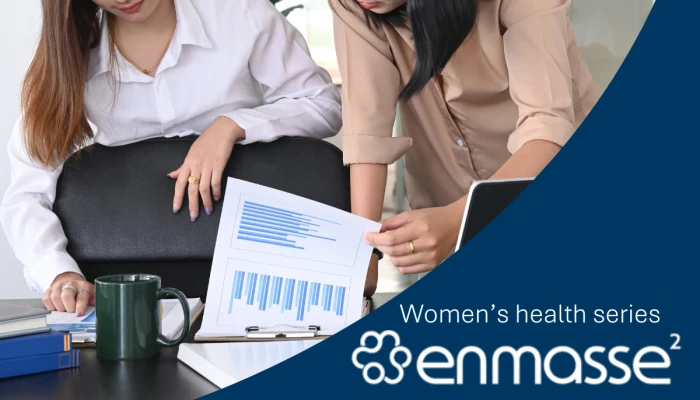Understanding women’s mental health: addressing unique challenges
Mental health disorders are notably more prevalent in women than in men. Statistics reveal one in four women will develop a mental illness in their lifetime compared to one in eight men.¹ Women experience anxiety, depression, PTSD, eating disorders and non-suicidal self-injury at higher rates than men.
Certain mental health risk factors contribute to this disparity. Women often navigate multiple roles, face gender inequity, experience higher rates of poverty, and are subjected domestic violence and sexual abuse. Additionally, some women also experience mental health issues related to fertility, childbearing and parenting.
These challenges are compounded by a tendency for some women to remain silent about their struggles. Historically, the medical profession has often been dismissive of women’s mental health issues, reducing them by describing symptoms as being dramatic or hysterical.
We also know is that various physical issues affecting women significantly impact their mental health. Expectations surrounding fertility and infertility are major sources of stress, sadness, anger, shame and grief. Up to 40% of women experiencing infertility also experience clinical depression or anxiety.² Those undergoing IVF experience higher levels of anxiety and depression yet very few seek support for their psychological distress.
Menstrual symptoms, though considered a normal part of life for many women they can exacerbate psychiatric symptoms in women, particularly increased psychosis, depression and substance use are evident during premenstrual and menstrual cycles.³ Recent research indicates women who suffer from endometriosis, often experiencing chronic pain, may also have increased vulnerability to depression, anxiety and eating disorders.⁴
The incidence of depression for women doubles during menopause, particularly for those who have a history of depression. There is also an increased vulnerability to anxiety during this time. Along with hormonal changes stressful life events also play a part in influencing mental health during this time.⁵
Acknowledging these issues and the impact they have on women is an important first step in addressing them. Not just from a personal perspective but in a workplace context as well.
Taking action to be informed and build and understanding of the unique impacts on women’s mental health can help women prepare and build resilience if some of these issues emerge. Consider your own health needs and factors that may impact them. Speak with partners, female friends and colleagues about what supports and resources they use to support themselves. Male friends and colleagues can also be included in the conversation as they may have insight from personal experience with family members or friends.
Normalising discussion around mental health with people in your day-to-day life is a good first step in finding and providing support for mental health problems. Including young people in this conversation is important as mental health issues often emerge in teenage years.
Explore with your employer what supports they have in place to support women’s mental health. Have they a policy for leave specifically for women’s health? Does the organisation’s EAP provider have women’s health specialists? Remember when having a conversation with your employer you are not obliged to divulge specific diagnosis but there are benefits to normalising mental health issues in the workplace to reduce stigma and contribute to a positive culture to enhance everyone’s workplace experience.
Workplaces play a pivotal role in supporting the mental health of all employees. In addition to leave policies and providing access to EAP, organisations can also assist by providing education for leaders and staff on understanding, recognising mental health issues and their impacts on women. They could also facilitate the creation of support networks for women to provide a platform to share experiences and advocate for their unique health needs. Flexible working arrangements, support with childcare, remote working options also contribute to a supportive and inclusive working environment.
Organisations where the contributions of women are valued and recognised and who have and understanding of the unique health challenges women face will ultimately have a healthier and more productive workforce.
Understanding and addressing women's mental health is crucial for fostering a supportive workplace. At Enmasse, we provide tailored training and resources to help organisations support women's mental health, creating a healthier, more inclusive environment.
Contact us today to learn more about our comprehensive solutions and start making a positive impact in your workplace. Email us at enquiries@enmasse2.com or visit our website for more information.
References:
1. Lan L., Jain S., Perspectives on global women’s mental health. https://www.psychiatrictimes.com/view/perspectives-on-global-womens-mental-health
2. Infertility: the impact of stress and mental health. https://www.psychiatry.org/news-room/apa-blogs/infertility-the-impact-of-stress-and-mental-health
3. Handy AB, Greenfield SF, Yonkers KA, Payne LA. Psychiatric Symptoms Across the Menstrual Cycle in Adult Women: A Comprehensive Review. Harv Rev Psychiatry. 2022 Mar-Apr 01;30(2):100-117. doi: 10.1097/HRP.0000000000000329. PMID: 35267252; PMCID: PMC8906247.
4. Blackman I. Women With Endometriosis Also Genetically Predisposed to Depression, Anxiety, and Eating Disorders
https://medicine.yale.edu/news-article/women-with-endometriosis-also-genetically-predisposed-to-depression-anxiety-and-eating-disorders/
5. Alblooshi, S., Taylor, M., & Gill, N. (2023). Does menopause elevate the risk for developing depression and anxiety? Results from a systematic review. Australasian Psychiatry, 31(2), 165-173.
https://doi.org/10.1177/10398562231165439


